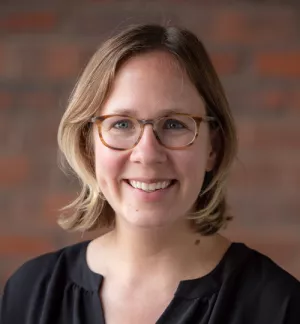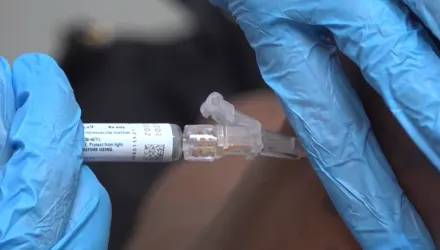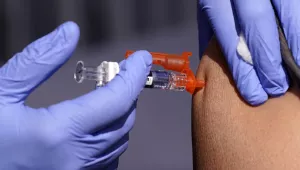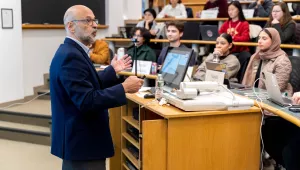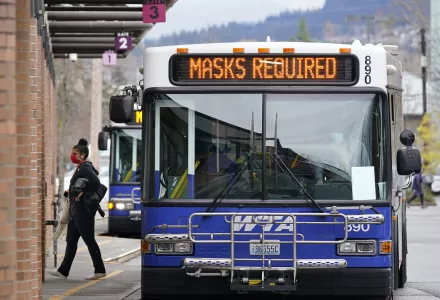
Since March, the Belfer Center’s scholars and practitioners have been physically distanced but intellectually close. They’ve faced the pandemic head-on, launching new types of research to explore the unusual, tragic circumstances of this year. Here, we focus on the activities of two of our experts who have provided valuable guidance and insights for the present and future: Juliette Kayyem and John P. Holdren.
‘I hope my voice can help guide response’
Kayyem, Faculty Director of the Belfer Center’s Homeland Security Project and Lecturer in International Security, has used all the tools in her media toolkit – Twitter, a column in The Atlantic, CNN, and the Belfer Center’s video series “Questions from Quarantine” – to share her expertise. “I hope my voice can help guide response,” she said in an email.
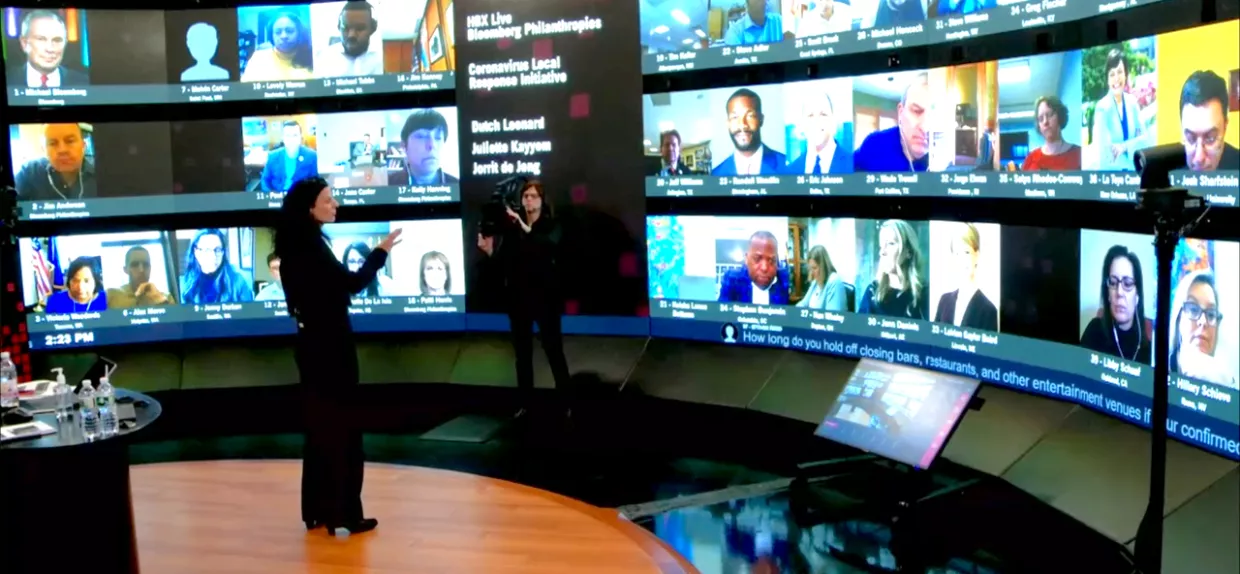
“My focus has always been on what do we do in response to the pandemic,” Kayyem said. “This was a 50-state homeland security disaster, with less than optimal national planning.”
A former Assistant Secretary for Intergovernmental Affairs at the Department of Homeland Security, Kayyem was teaching a course on crisis management at Harvard Kennedy School when the pandemic started.
Also this spring, Kayyem joined more than 700 mayors and municipal leaders from around the world for two-hour Zoom sessions on emergency management and crisis communications. The sessions, hosted by the Bloomberg Harvard City Leadership Initiative, also gave the mayors the opportunity to share their experiences and to build an important network.
Kayyem’s columns in The Atlantic provide sage words for an even larger audience: those of us trying to prepare and set parameters around the pandemic within our households. She cautioned in March that the pandemic could last 18 months. “Be Prepared,” the headline warned. In her columns, Kayyem has observed how the pandemic accelerated trends toward work-from-home – and the difficulties businesses will face returning to work-in-person. With the COVID-19 vaccine rollout now on the horizon, Kayyem wrote that Americans can give themselves permission to feel hopeful.
“[The vaccine delivery program] will be tough, complex, sometimes it will seem unfair … but it is hopeful news and we deserve that.”
–Juliette Kayyem
Kayyem added that through her national and local media efforts, she is looking forward to helping "advise and guide this difficult vaccine delivery program. It will be tough, complex, sometimes it will seem unfair … but it is hopeful news and we deserve that.”
Kayyem costars in the Belfer Center’s “Questions From Quarantine” video series, in which she and the Security and Global Health Project’s Margaret Bourdeaux tackle questions on immunity passports, mask guidelines, protesting during a pandemic, and more. Originated and hosted by Project Coordinator Tara Tyrrell, the first episode aired on March 31, about two weeks after wide-scale remote work began. The series is closing in on its 40th episode, all of which can be found on the Belfer Center’s YouTube page. The series is produced by Belfer Center Multimedia Producer Benn Craig.
Former Presidential Advisors Offer Guidance on Future Pandemic Preparedness and Response
“Early in the COVID-19 pandemic, it struck me that it could be useful to revisit and update some of what the Obama administration had thought and done about epidemic preparedness and response,” said John P. Holdren, Co-Director of the Science, Technology, and Public Policy Program.
Holdren, who was President Barack Obama’s Science Advisor, also co-chaired the President’s Council of Advisors on Science and Technology (PCAST), which produced six reports on epidemic-related topics between 2009 and 2016. In March of 2020, Holdren called that group together (virtually) and they agreed to meet weekly via Zoom to write six more reports, this time focusing on improving America’s capacity to deal with subsequent waves of COVID-19 and future pandemics.
The group recruited by Holdren, which for this work calls themselves OPCAST to differentiate from their original PCAST group, includes: “my PCAST co-chairs, Broad Institute Founding Director Eric Lander and former National Institutes of Health Director Harold Varmus; PCAST vice chairs Bill Press of the University of Texas, Austin, and Maxine Savitz of the National Academy of Engineering; and five other experts from UC Berkeley, UC San Francisco, Princeton, and Yale.”
“Early in the COVID-19 pandemic, it struck me that it could be useful to revisit and update some of what the Obama administration had thought and done about epidemic preparedness and response."
–John P. Holdren
Topics covered in the earlier PCAST reports included the H1N1 epidemic, re-engineering the vaccine-production enterprise, propelling innovation in drug development, systems engineering to improve health care, and preparation for both natural and malicious biothreats.
The reports that the OPCAST group has produced and published since March include: improving data management in a pandemic; the national pandemic stockpile; testing technologies and practice; contact tracing; epidemiological modeling; and an agenda for a National COVID-19 Commission. Each report begins with background on the chosen topic and an assessment of how well the country has fared in tackling it. For example, when it came to epidemiological modeling via the media, “the experience was not salutary,” the authors write. From there, the authors outline a series of recommendations.
The reports, which are online at https://opcast.org, have been provided to the pandemic leaders in the Trump administration, the Biden-Harris team, members of Congress, governors, other opinion leaders in the public health domain, and the media. The team has no sponsors and no budget. Its members are serving as individuals and on their own time.
Click here to return to Belfer Center Newsletter
"Staying Safe Today, Preparing for Tomorrow." Belfer Center Newsletter, Belfer Center for Science and International Affairs, Harvard Kennedy School. (Fall 2020)


